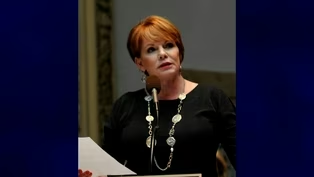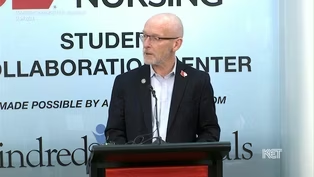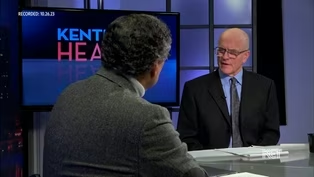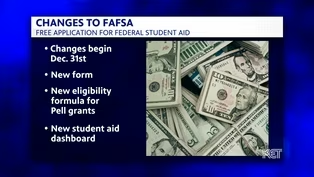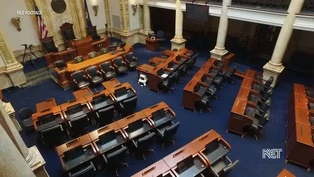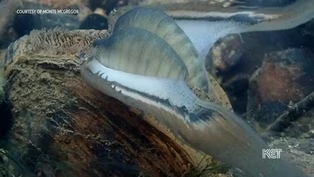
Skepticism Around Ibogaine
Clip: Season 2 Episode 134 | 3m 37sVideo has Closed Captions
Supporters say Ibogaine can curb opioid addiction withdrawals and create a path to ...
Supporters say Ibogaine can curb opioid addiction withdrawals and create a path to recovery, but it has its critics.
Problems playing video? | Closed Captioning Feedback
Problems playing video? | Closed Captioning Feedback
Kentucky Edition is a local public television program presented by KET

Skepticism Around Ibogaine
Clip: Season 2 Episode 134 | 3m 37sVideo has Closed Captions
Supporters say Ibogaine can curb opioid addiction withdrawals and create a path to recovery, but it has its critics.
Problems playing video? | Closed Captioning Feedback
How to Watch Kentucky Edition
Kentucky Edition is available to stream on pbs.org and the free PBS App, available on iPhone, Apple TV, Android TV, Android smartphones, Amazon Fire TV, Amazon Fire Tablet, Roku, Samsung Smart TV, and Vizio.
Providing Support for PBS.org
Learn Moreabout PBS online sponsorshipFor the past few days, we brought you several stories about a psychedelic plant called Ibogaine.
Supporters say it can curb opioid addiction withdrawals and create a path to recovery.
But it has its critics who are concerned about the lack of research.
We spoke to one addiction expert in Kentucky about his cause for concern.
We need to be open to the idea of novel therapeutic for substance use disorders writ large.
We should be open to studying psychedelics for substance use disorders, including opioid use disorder.
I would think about other things like psilocybin as an example before we think about ibogaine.
The research with ibogaine is is very much based on case report and observational studies.
And so the evidence base to suggest that ibogaine is effective for opioid use disorder in particular, that's really where it's been studied the most.
It's not as strong or as rigorous as we might like.
So, you know, so then that leads us to the idea that maybe we want to do more research with it, but there are some regulatory challenges.
It acts on a heart channel that basically prolongs the contract and relaxation of the heart muscle that can lead to fatal arrhythmias.
That doesn't mean that it is always fatal, but it is a significant concern.
So, again, to go back to my point about the Heart channel that it acts on is called the Hurd Channel.
The FDA, when they're thinking about approving a new drug or testing a new let's even start there.
Go back a step, testing a new drug is if that drug has herd activity, which ibogaine does.
That is often a nonstarter with the FDA.
They will not let you test that drug in people.
So even if we thought, okay, let's move the game forward, I don't know that the FDA would allow clinical testing in the United States.
So I think that's something that would have to be figured out.
Right.
Like, if we're going to invest all this money, can we even do this work in the U.S. or Kentucky?
I think there's sort of practical regulatory and safety considerations, not to just mention the lack of the sort of scientific, rigorous scientific controlled studies we would want to tell us that ibogaine is effective.
You know, $42 million is a lot of money.
It absolutely is.
When you bring a drug to market, we are talking on the order of billions of dollars to bring a drug to market.
$42 million will get us somewhere, but we'll certainly not bring ibogaine to market.
I would argue, yes, that that that money could be used for some real evidence based interventions that we know work.
You know, I think I think that a lot of the argument is and I don't I don't agree with this argument, I want to make clear that, you know, the existing treatments don't work.
I think that they could work better.
But I think also that people can't access them.
So this 42 million could go to increasing access to things like methadone or buprenorphine.
It could go you know, it could go to naloxone access.
And again, yes, we we can and should be thinking about novel approaches to opioid use disorder and substance use disorder.
And I think there are ways to do that.
I, again, would caution against advancing ibogaine for all the reasons that I mentioned and say, yeah, we need more, but we know what works.
How about more of that?
The Kentucky Opioid Abatement Advisory Commission is considering $42 million for ibogaine research that would come from nearly the $900 million Kentucky received as opioid settlement money.
The commission will hold more public hearings before any money is allocated.
Another Longtime KY Lawmaker Leaving Frankfort
Video has Closed Captions
Clip: S2 Ep134 | 25s | State Senator Denise Harper Angel says she will not run for reelection next year. (25s)
A Boost for Louisville’s School of Nursing
Video has Closed Captions
Clip: S2 Ep134 | 1m 35s | The University of Louisville's School of Nursing has received a boost in its efforts to... (1m 35s)
Video has Closed Captions
Clip: S2 Ep134 | 2m 52s | One in eight American women is at risk of developing breast cancer, according to the ... (2m 52s)
Changes Coming to the FAFSA Program
Video has Closed Captions
Clip: S2 Ep134 | 31s | FAFSA stands for “Free Application for Federal Student Aid.” The program lets future ... (31s)
Video has Closed Captions
Clip: S2 Ep134 | 2m 27s | The dangers of "low head" dams and how a Kentucky community is honoring former First ... (2m 27s)
Lawmakers React to “Fast-Tracking” Report
Video has Closed Captions
Clip: S2 Ep134 | 8m 32s | Lawmakers are reacting to a new report from the progressive-leaning League of Women ... (8m 32s)
Video has Closed Captions
Clip: S2 Ep134 | 4m 36s | While several species of mussels are on the verge of extinction, the Kentucky ... (4m 36s)
Providing Support for PBS.org
Learn Moreabout PBS online sponsorship
- News and Public Affairs

Top journalists deliver compelling original analysis of the hour's headlines.

- News and Public Affairs

FRONTLINE is investigative journalism that questions, explains and changes our world.












Support for PBS provided by:
Kentucky Edition is a local public television program presented by KET
